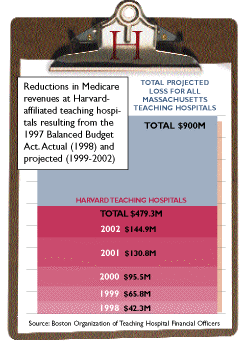![]()
Main Menu ·
Search ·
Current Issue · Contact · Archives · Centennial · Letters to the Editor · FAQs
![]()
Main Menu ·
Search ·
Current Issue · Contact · Archives · Centennial · Letters to the Editor · FAQs

|
Their profession teaches doctors to expect new, strange, even horrifying sights, but officials at Massachusetts teaching hospitals--long considered the jewel in the crown of the nation's healthcare and research system--are saying that they have never seen anything like this before. Ever since passage of the Balanced Budget Act (BBA) of 1997, the hospitals have been hemorrhaging cash at an unprecedented rate, and the prognosis is not good. Massachusetts General Hospital reports an operating loss of $4.8 million in the first quarter of 1999 alone, according to James Mongan, M.D., its president. Brigham and Women's Hospital, which has formed a partnership with Mass General, lost $3.5 million in the same period.
In 1998, the BBA lowered the level at which Medicare reimburses hospitals for medical procedures and suspended for that year the annual "update" increase that compensates for inflation. The update was restored this year, albeit at lower levels, but the overall reimbursement level remains almost 10 percent lower than it would have been prior to the BBA--and cuts will worsen during the next four years. The Coalition of Boston Teaching Hospitals claims the BBA will cost the state's teaching hospitals an estimated $900 million in the next five years.
More than half the total cuts to Massachusetts teaching hospitals will be inflicted on Harvard affiliates, which will see almost 20 percent of their Medicare revenue lopped by 2002 (see chart). Hospital officials hope their lobbying efforts will convince Washington to somehow blunt the BBA and give them the opportunity, at the very least, to stabilize themselves.
Teaching hospitals, thought by lawmakers to have fatter budgets than community hospitals, were preferentially targeted by the BBA cuts, and administrators are crying foul. "Over the past five years," says Jeffrey Otten, president of Brigham and Women's Hospital, "hospitals have behaved responsibly in reducing costs and unnecessary hospitalizations. One in five Massachusetts hospitals has closed, almost 40 percent of Boston's hospital beds are gone, and we've seen many mergers that have increased efficiency. Had the BBA been passed four years ago, we would have had some degree of freedom to respond, but by 1997, the fat was already cut."
Should teaching hospitals falter or fail, physician training will not be the only portion of their mission to suffer. These institutions accept referrals for the sickest patients, and routinely plow "profits" back into researching new clinical interventions and drugs; developing and purchasing technology to provide state-of-the-art treatment; and charting the future of clinical medicine. They also finance many small-scale experiments with the potential to blossom into innovative approaches to difficult medical problems like AIDS, cancer, and heart disease.
"We're in the middle of a golden era in medical research and treatment," says Otten, "and right when we should be capturing the benefits, we're jeopardizing things. It's our responsibility to take this situation to Washington and do something about it before it's too late."
~ John F. Lauerman
Main Menu ·
Search · Current Issue · Contact · Archives · Centennial · Letters to the Editor · FAQs
![]()